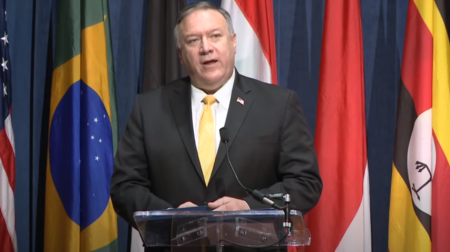US, 31 other countries sign document declaring ‘there is no international right to abortion’

The United States, along with 31 other countries, signed on Thursday a document declaring that “there is no international right to abortion.”
The two-page Geneva Consensus Declaration on Protecting Women’s Health and Strengthening the Family was cosponsored by the U.S., Brazil, Egypt, Hungary, Indonesia and Uganda. Because of the coronavirus pandemic, the signing of the document took place at a virtual multinational ceremony instead of at the World Health Assembly in Geneva, Switzerland, as originally scheduled.
The other signatories to the Geneva Consensus Declaration were Bahrain, Belarus, Benin, Burkina Faso, Cameroon, the Democratic Republic of the Congo, Congo, Djibouti, Eswatini, The Gambia, Haiti, Iraq, Kenya, Kuwait, Libya, Nauru, Niger, Oman, Pakistan, Poland, Saudi Arabia, Senegal, South Sudan, Sudan, the United Arab Emirates and Zambia.
While the Geneva Consensus Declaration touched upon several issues of importance to the international community, including universal healthcare as well as women’s rights and equality, the signatories made their opposition to abortion clear.
“There is no international right to abortion, nor any international obligation on the part of States to finance or facilitate abortion, consistent with the long-standing international consensus that each nation has the sovereign right to implement programs and activities consistent with their laws and policies,” the document explains.
The Geneva Consensus Declaration reaffirms “the inherent ‘dignity and worth of the human person,’ that ‘every human being has the inherent right to life,’ and the commitment ‘to enable women to go safely through pregnancy and childbirth and provide couples with the best chance of having a healthy infant.’” The document frequently references the Universal Declaration of Human Rights, crafted by the United Nations General Assembly in 1948.
It also emphasizes that “‘in no case should abortion be promoted as a method of family planning’ and that ‘any measures or changes related to abortion within the health system can only be determined at the national or local level according to the national legislative process.” The consensus stresses that “the child … needs special safeguards and care … before as well as after birth.”
“Under President Trump’s leadership, the United States has defended the dignity of human life everywhere and always. He’s done it like no other president in history,” Secretary of State Mike Pompeo said at remarks delivered alongside U.S. Secretary of Health and Human Services Alex Azar shortly after the signing ceremony.
“We’ve also mounted an unprecedented defense of the unborn abroad.”
Pompeo described the Geneva Consensus Declaration, which “protects women’s health, defends the unborn, and reiterates the vital importance of the family as the foundation of society,” as the “next step” in the Trump administration’s international pro-life efforts.
In his remarks, Azar referred to the Declaration as “much more than a statement of beliefs.” He expressed disappointment that “women around the world unnecessarily suffer health challenges—all too often, deadly health challenges—while too many wealthy nations and international institutions put a myopic focus on a radical agenda that is offensive to many cultures and derails agreement on women’s health priorities.”
“Today, we put down a clear marker: No longer can U.N. agencies reinterpret and misinterpret agreed-upon language without accountability. Member States set the policy for the U.N. to pursue. Not the other way around,” he asserted.
The Geneva Consensus Declaration comes a year after the Trump administration slammed the United Nations for “undermining the role of the family” and urged the supranational organization to remove pro-abortion language from some of its documents. Earlier this year, the administration chastised the U.N. for promoting abortion as part of the global response to the coronavirus pandemic.
The push for abortion in the international community also extends to nongovernmental organizations. The human rights advocacy group Amnesty International recently updated its policy on abortion to express support for unrestricted abortion up until the moment of birth.





















